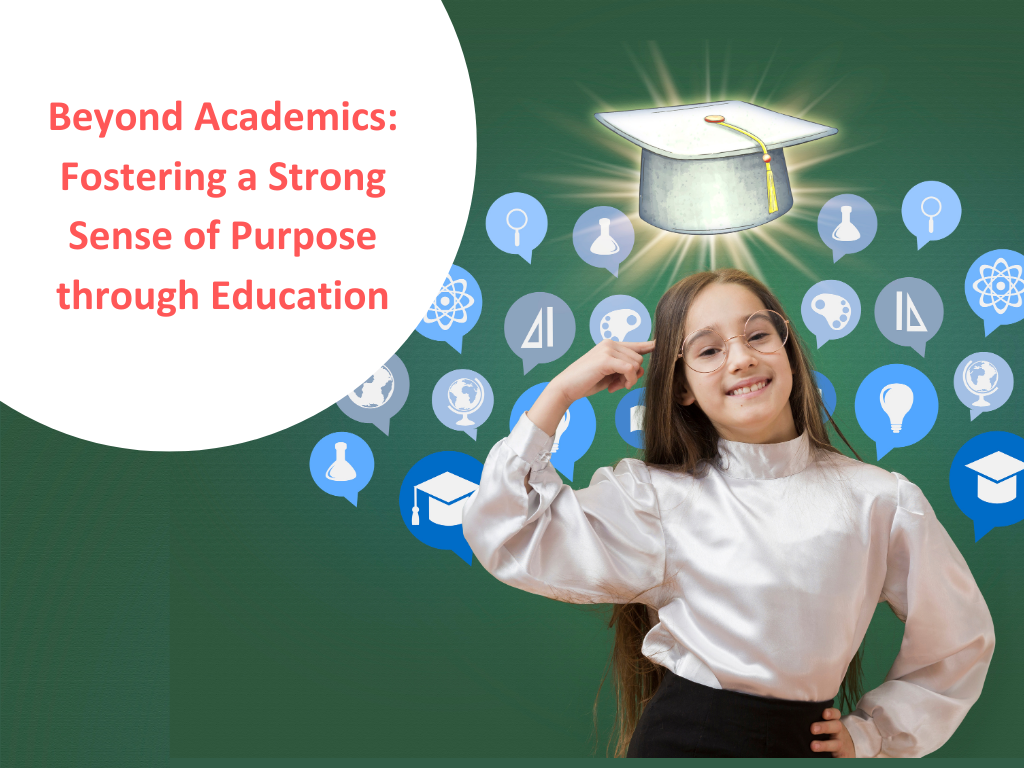The conventional view of education often limits its scope to academic instruction and the acquisition of knowledge that is assessed through standardized testing. However, as our world grows increasingly complex and interconnected, the role of education must evolve. Schools like K.R. Mangalam Global School, GK-I are at the forefront of this transformation, recognizing the need to not only impart knowledge but also to foster a strong sense of purpose in their students. This deeper approach to learning equips young people with the resilience, direction, and drive they need to navigate life’s challenges and contribute positively to society. In this blog, we explore how education can transcend the confines of traditional academia to cultivate a profound sense of purpose in students.
Redefining the Goals of Education
To build a foundation for a purposeful education, we must first redefine the objectives of our learning institutions. Education is not solely about producing workers who can read, write, and perform arithmetic; it is about shaping individuals who are prepared to tackle the world’s complex issues with empathy, innovation, and resilience. This means fostering critical thinking, emotional intelligence, and moral reasoning in addition to academic competencies.
The Pillars of Purposeful Education
Purposeful education stands on four pillars: self-awareness, empathy, passion, and contribution. Self-awareness encourages students to understand their strengths, weaknesses, and values. Empathy allows them to connect with others and understand diverse perspectives. Passion fuels their motivation, while a focus on contribution directs their energies toward the common good.
Integrating a Purpose-Driven Curriculum
A purpose-driven curriculum goes beyond the standard subjects to include themes of personal development, social responsibility, and global citizenship. Courses in philosophy, ethics, and social sciences can play a pivotal role in helping students form a worldview that is both informed and compassionate.
Holistic Development
Schools that embrace a holistic approach to education recognize that intellectual development must be accompanied by emotional and social growth. This can be achieved through activities such as community service, extracurricular clubs, and leadership programs. These experiences help students discover their passions and develop a sense of responsibility to their communities.
The Role of Educators
Educators are the facilitators of purpose in education. By modeling purposeful behavior, engaging in meaningful conversations, and providing guidance, teachers can inspire students to seek out their own paths of fulfillment and impact. They can also create a learning environment that celebrates diversity, encourages critical inquiry, and promotes a culture of collaboration.
Experiential Learning
Experiential learning is an effective means to deepen understanding and solidify a sense of purpose. Through internships, service learning, and project-based initiatives, students can apply classroom knowledge to real-world problems, reflecting on their experiences and learning from both successes and challenges.
Encouraging Self-Reflection
A curriculum that promotes self-reflection allows students to contemplate their place in the world and their ability to effect change. Journals, reflective essays, and discussion groups can be valuable tools in helping students to internalize their experiences and insights.
Empowering Student Voice
When students feel that their opinions are valued, they are more likely to engage deeply with their education. Schools should encourage student participation in decision-making processes and support initiatives that are driven by student interests and concerns.
Cultivating Resilience and Adaptability
Purposeful education helps students develop the resilience to overcome setbacks and the adaptability to navigate a rapidly changing world. By learning to cope with failure and uncertainty, students build the character and confidence they need to pursue their goals relentlessly.
The Impact on Mental Health
A strong sense of purpose has been linked to better mental health outcomes. Education systems that prioritize purpose help to mitigate the stress and anxiety that can come from academic pressure, creating healthier and happier students.
Measuring Success Beyond Grades
While grades are a traditional measure of academic success, they do not fully capture a student’s growth or contribution. Schools must develop new metrics that can assess personal development, creativity, and community engagement.
Connecting with the Global Community
Purposeful education encourages students to think globally and act locally. By connecting with peers around the world through exchange programs, online collaborations, and global challenges, students expand their horizons and develop a sense of solidarity with the global community.
The Importance of Lifelong Learning
Instilling a love for lifelong learning ensures that education does not end at graduation. Students who leave school with an intrinsic motivation to continue learning are better prepared to adapt to new situations and continue growing personally and professionally throughout their lives.
Conclusion
A strong sense of purpose is the keystone of a fulfilling life. By moving beyond a strictly academic focus, educators at K.R. Mangalam Global School, GK-I can impart a more profound and purposeful education—one that equips students with the tools not just to succeed in the workplace, but to lead meaningful lives. As society evolves, so too must our approach to education, ensuring that we are developing not only the minds but also the hearts of tomorrow’s leaders. Through purposeful education, we can inspire a generation of motivated, empathetic, and engaged individuals who are ready to make a positive impact on the world.
